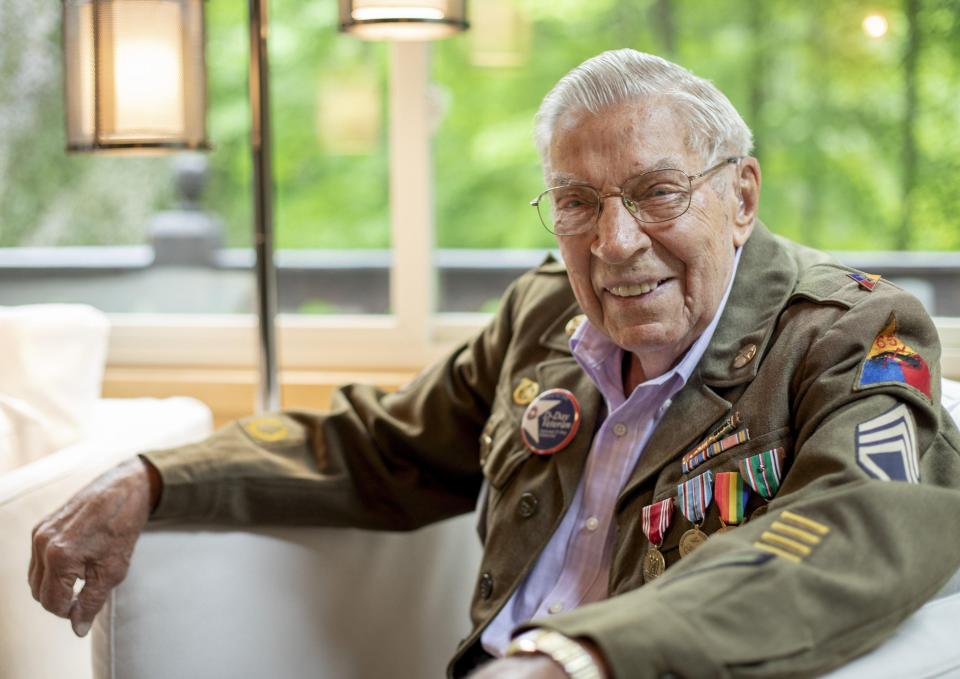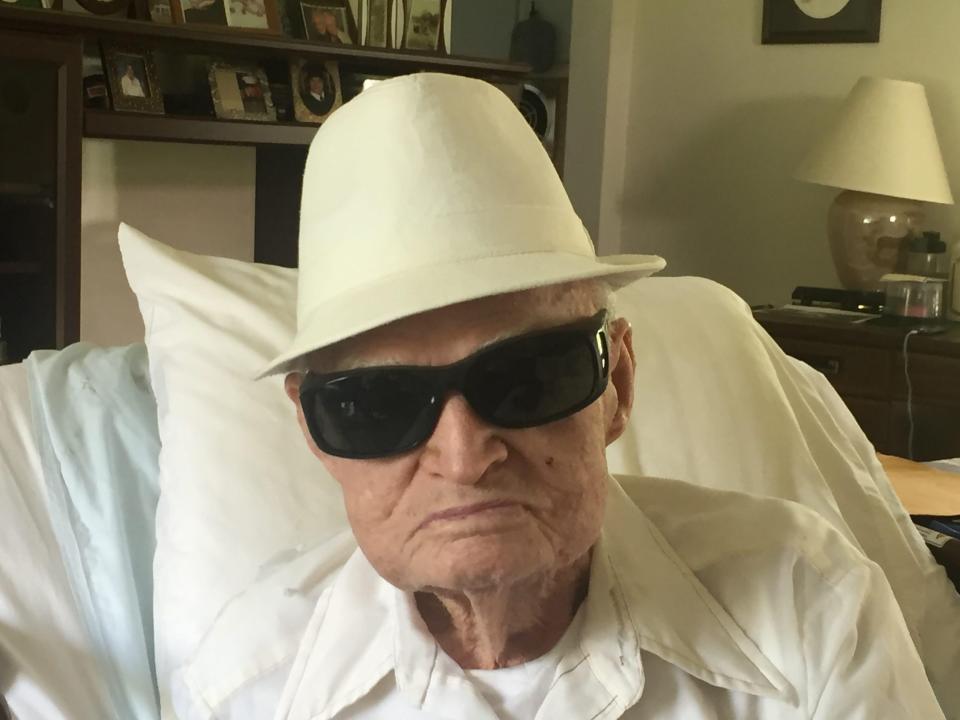Stories of survival by veterans who were at Normandy still resonate this D-Day anniversary
Monday marks the 78th anniversary of D-Day, when Allied forces launched the largest military invasion by land, air and sea in history to retake northwest Europe from Nazi forces.
The Associated Press had two dozen writers and photographers among the Allied forces as they landed on France's Normandy coast on June 6, 1944 in an assault code-named "Operation Overlord."
At 9:32 a.m., AP received the news flash from Gen. Dwight D. Eisenhower’s London headquarters that read: ALLIES LAND IN FRANCE.
The United States, Canada and the United Kingdom deployed more than 5,000 ships, 11,000 airplanes and 150,000 soldiers, landing on several beachheads in Normandy and parachuting or riding gliders inland into Nazi-occupied territory. More than 20,000 Americans lost their lives on Normandy's shores.
Here are highlights of stories that were previously published in The Dispatch from three central Ohio men who landed at Normandy, fought in Europe and survived.
Lawrence McCauley

Lawrence McCauley, now 99, tried to join the Marines in January 1942, but his eyeglasses prevented it. Months later, the Army drafted him.
McCauley was a member of the 65th Armored Field Artillery Battalion, trained to drive trucks armed with .50-caliber machine guns, halftracks and landing craft, just in case. In England, preparing for the D-Day invasion, he became fast friends with Otto Lutz, a tall Chicagoan.
“We were all very close,” he said of his unit when he was interviewed in 2020 at the age of 97 and living in Lewis Center. “You knew about their wives and children — everything you could know about your buddy, because there was nothing else to talk about.”
He and Otto were next to each other on a landing craft as it approached Omaha Beach. The front door dropped open and a bullet hit Otto in the forehead. McCauley remembers looking back and seeing his friend’s face sink beneath the water.
“There was no stopping,” he said. “Our orders were `Don’t stop,’ because you’re better off as a moving target. That’s hard.”
Read more: Central Ohio veteran, 97, only now opening up about D-Day experience
The 65th fought their way off the beach that day and climbed the bluffs. McCauley remembers the feeling as he reached the top: “Best grass I’ve ever seen.”
He was involved in the hardest fighting through France and Belgium, including the Battle of Hurtgen Forest and the Battle of the Bulge.
On April 11, 1945, McCauley was among the first to reach Buchenwald, a Nazi concentration camp located atop Ettersberg hill about five miles northwest of Weimar in east-central Germany. They liberated 21,000 emaciated inmates.
“They were packed in like sardines,” he said.
Later, McCauley’s unit stopped a train, opened it up and found young Jewish girls inside. They directed them to safety behind American lines.
In October 2020, McCauley was awarded the French Legion of Honor medal by Guillaume Lacroix, the consul general for France to the Midwest. The medal, the highest French award for military and civil merits established by Napoleon Bonaparte in 1802, was presented to McCauley for his efforts during World War II to rescue the French people from Nazi occupation.
Donald I. Jakeway
Donald I. Jakeway recounted before his death in November 2019 the blitzing heat of a bullet flying by his face.
Jakeway, a Johnstown resident, jumped with the Army 82nd Airborne's 508th Parachute Infantry into Normandy 15 minutes after midnight on D-Day.
Storms of flak rocketed through the sky around Jakeway as he parachuted down. He landed in a tree in a churchyard. After he cut himself out and landed on the ground, it took him 10 days to reunite with his company, during which time he traveled with the British and another U.S. company. He fought through Normandy for 37 days.
“Europe had been under occupation for three to four years,” Jakeway said. “They had fortified (Normandy) ... Everyone was just like slaves.”
Read more: D-Day memory vivid for Johnstown man
American, British and Canadian forces landed on five beaches along a 50-mile stretch of France’s Normandy coast, where they met stiff resistance from well-entrenched Germans in concrete bunkers placed at strategic points along the coast and beaches with mines and other anti-tank obstacles as well as wooden stakes, barbed wire, and metal tripods to impede landing craft and the movement of troops once ashore.
Within three months, however, the northern part of France would be freed by more than 2 million Allied troops and the invasion force would be preparing to enter Germany, where they would meet up with Soviet forces moving in from the east.
Jakeway continued to fight until a sniper bullet struck him in the chest on Jan. 31, 1945. He recovered in an English hospital until that August, then he was sent home.
Vance Hill

Vance "Red" Hill, now 104, didn't have to fight for his country in World War II.
A native of Iberia in Morrow County, he was married with two children and another on the way. At 26, he could have taken a deferment.
Hill's wife didn't want him to go. Neither did his church. But Hill saw his 17-year-old brother going off to war and felt he should do the same.
Read more: Ohio man, 102, recalls serving in U.S. Army on D-Day
"I thought it was as much my fight as it was his," a now-104-year-old Hill said in a 2020 interview from a nursing home in Richland County at the age of 102.
His service in the U.S. Army included landing in Normandy on D-Day Plus One. Once he waded ashore from a landing craft and headed inland, Hill served an important and dangerous role as a point scout who went ahead of most of the forces.
"You didn't last long," Hill said of scouts. "Not many made it through. I had both of my hands almost blown off."
He recalls the day he almost lost his hands, which occurred several months after D-Day when he remembers getting to the edge of a town.
"I ran into a machine gun," he said. "When I hit the ditch, it felt like every bullet was going right through me. That's when they dropped the mortar in."
He spent one night in the field hospital, then was flown to the United Kingdom. Hill's time as a soldier was over after 15 months. He later received a Purple Heart.
@zariajohnson24
zjohnson@dispatch.com
This article originally appeared on The Columbus Dispatch: Three WWII veterans recall their D-Day experiences

